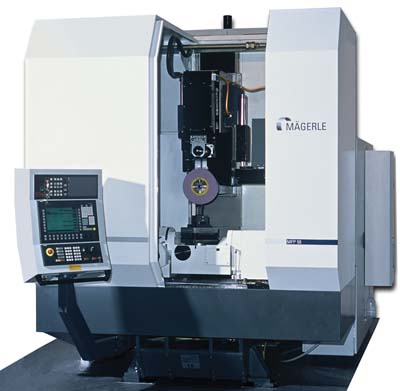Magerle MFP CD Grinder
Magerle MFP CD Grinder
United Grinding Technologies offers the new Magerle MFP 50 5-axis CD Grinding Center featuring automatic grinding wheel and tool changer, representing one of the most flexible, multi-tasking CD grinders in the Magerle family.

United Grinding Technologies offers the new Magerle MFP 50 5-axis CD Grinding Center featuring automatic grinding wheel and tool changer, representing one of the most flexible, multi-tasking CD grinders in the Magerle family.
The MFP 50 is the smallest in the Magerle machine line and offers a great number of various configurations, depending on the application. The compact and symmetrical traversing sliding column design, together with precision pre-loaded ball screws and wide hydrostatic guideway bearings, ensures high static, dynamic and thermal stability.
The MFP 50 includes an integrated automatic tool changer which can switch wheels in eight seconds using a swing arm configuration. Maximum tool dimensions are 300mm x 60mm x 76.2mm, and wheel/tool changer capacity, depending on the diameter, is 10 to 30 conventional grinding wheels, plated or ceramic bonded CBN wheels as well as drilling and milling tools. A reliable HSK-80 wheel flange system offers rigidity and precision needed for close tolerance parts with high surface finish requirements. Tool options include vitrified CBN, plated CBN, conventional grinding wheels and various other metal cutting options.
The machine is equipped with a proven overhead mounted two axes CD diamond dresser with horizontal and vertical NC axis for the accommodation of several diamond rolls with various profiles for CD or non-CD, as well as for CNC dressing with a disc. The grinding wheels with different profiles are always on the same spindle position.
An important feature of the MFP 50 are its guideways. Magerle developed hydrostatic wrap-around guideways utilized in the Y-axis. These are 100 percent wear-free and offer high rigidity and load capacity, optimum smoothness and vibration dampening and maximum precision and process reliability. All main axes of the MFP 50 can rapid traverse at 20,000mm/min (790 ipm). X-axis travel is 500mm, Y-axis spindle travel is 660mm and Z-axis travel is 660mm.
The MFP 50 features state-of-the-art Siemens Sinumerik 840D digital controls. Machine operation, setup, changeover, dressing and programming of even complex parts are easily accomplished through the operator-friendly control. Typical applications include turbine vanes and blades, small turbine and compressor blades, machining both sides of fir tree and root shank faces, shroud and z-notch profiles, both sides and slots if required. The automatic tool changer allows the use of the right abrasive for each feature plated CBN for radial slots, vitrified CBN for blade W-forms, conventional abrasives for radial slots and blade fir trees.





